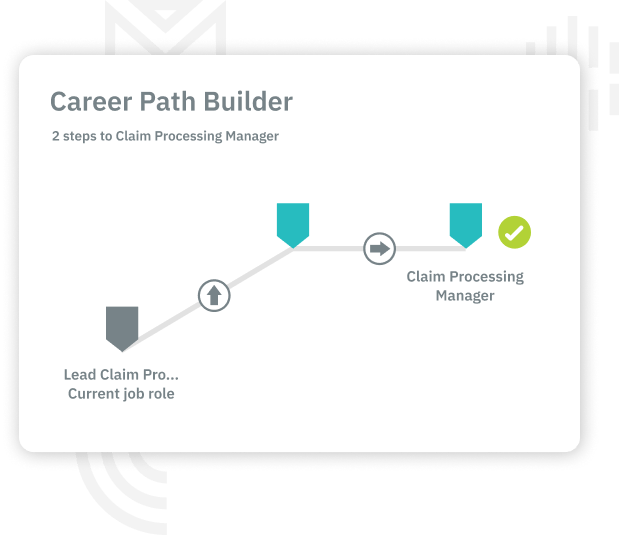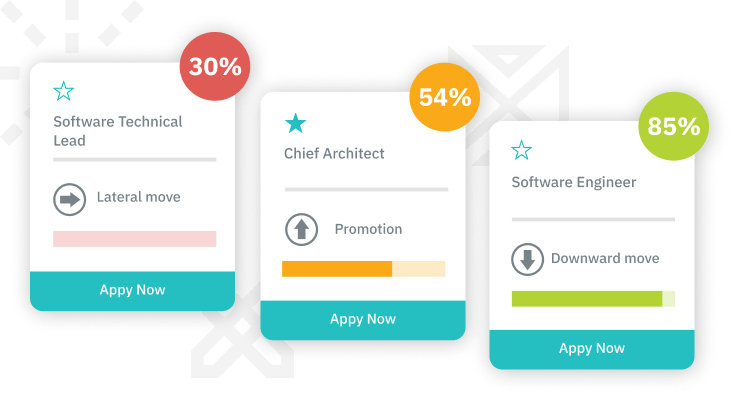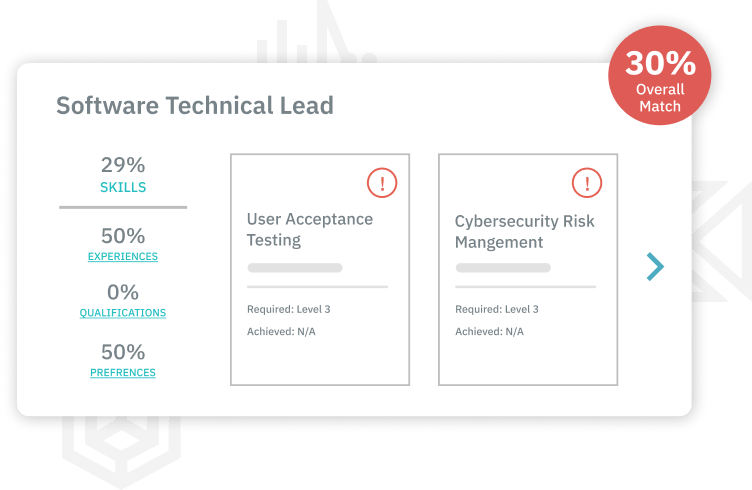Best Career Management Tool
Empower employees to forge their own futures
Support your talents’ aspirations and career management goals by providing them with organizational visibility by utilizing career pathing software.
Career Pathing Software Overview
TalentGuard’s career management software revolutionizes employee development by empowering individuals to take charge of their career progression. Rather than following the traditional corporate ladder, where employees move from job to job in a rigid, vertical structure, today’s workforce seeks flexibility and strategic insights into multiple career directions. Our software allows employees to map out unlimited career path scenarios, whether they involve lateral, upward, or even downward transitions, providing a comprehensive view of their potential growth within your organization.
Career Management Value
With TalentGuard’s Career Pathing, employees can assess job competencies, identify skill and qualification gaps, and estimate the time required to advance along their chosen pathways. This gives employees the control and visibility needed to actively manage their career development, fostering accountability and motivation. It also enables them to explore opportunities they may not have previously considered, helping them find the best-fit roles within your company.
For organizations, our software simplifies the process of managing employee development while offering the flexibility employees crave. By providing employees with clear career options, organizations can increase engagement, reduce turnover, and cultivate a more satisfied, committed workforce. Engaged employees are more likely to stay, be productive, and take ownership of their roles, leading to a stronger organizational culture and better business outcomes.
TalentGuard’s Career Pathing solution helps you retain top talent by making career growth an integral part of your company culture, giving employees a clear future within your organization.
Career Lattice Mobility
Provide employees with career path tools to explore, assess, and determine ideal role fit within the organization, and develop a career roadmap to achieve success. Click a button and employees can create customized development plans with information on specific learning resources based on a host of future roles.
Meaningful Feedback and Coaching
Career Pathing by TalentGuard® highlights popular roles, consolidates training and development needs, and highlights employee development paths, enabling your managers to have more purposeful career planning conversations with their staff. It creates tailored individual development plans that include the full range of development options to suit their career aspirations.
Better Employer Branding
Whether you are recruiting top talent or launching another performance review program, our Career Pathing tool supports your empoyer brand because you can demonstrate to employees that you care about their long-term career growth and development.

Visibility that sparks initiative
We empower employees with the visibility they need to actively explore and shape their career journey within your company. By giving them the ability to map personalized career paths based on their competencies and goals, employees can see their full range of options—whether they’re striving for leadership roles or seeking fulfillment in their current position. This clear, strategic view encourages initiative, allowing employees to take ownership of their development and make informed decisions about their career progression, boosting engagement and driving long-term success for both the employee and the organization.

Agile matching of people and roles
We support agile matching, seamlessly connecting employees with roles that align with their skills, qualifications, and career aspirations. Using advanced AI, the platform dynamically identifies the best-fit opportunities within your organization, ensuring that employees are matched with roles where they can thrive and contribute effectively. This agile approach not only accelerates internal mobility but also helps your company fill key positions quickly, reduce skill gaps, and foster a more adaptable and engaged workforce.

Growth with purpose
We help employees to grow with purpose by aligning their personal development goals with the strategic needs of your organization. With clear insights into skill gaps and personalized career paths, employees can take meaningful steps toward their career advancement while contributing to the company’s success. This purposeful growth fosters greater engagement, motivation, and retention, ensuring that each employee’s development journey is not only fulfilling but also aligned with the company’s long-term objectives.
Get Your Free Demo & See our Platform in Action
Select from one of the bundles below and we will tailored the demo to your needs. Let us show you how TalentGuard’s solutions adapt to your industry.
Free Trial
Free to start
$0
Upfront Commitment
(No hidden charges)
A competency management system loaded with pre-built competencies and job models, designed to streamline skill development, job role creation, competency mapping, and talent management for your organization.
Restrictions apply so please read the eligibility criteria.
Automate
Transform the way your organization defines, manages, and evolves job roles with WorkforceGPT—the AI-powered solution that rapidly generates comprehensive job profiles, skills taxonomies, and career progression maps tailored to your workforce.
WorkforceGPT tracks millions of data points to generate precise, standardized, and up-to-date job architectures—all in a fraction of the time it takes with traditional methods.
With our AI-driven system, you can:
- Create Smart Job Descriptions – Standardize language and tone across roles effortlessly.
- Build AI-Powered Skills Taxonomies – Define skills, clusters, and proficiency statements with accuracy.
- Seamlessly Map Skills to Roles – Align required skills and proficiencies across job grades.
- Enable Dynamic Career Pathing – Real-time updates based on employee movement.
- Deliver Personalized Learning Paths – Address individual skill gaps with just-in-time development.
- Gain Predictive Skill Insights – Stay ahead of workforce demands.
Engage
Employees need clear career paths, relevant skills development, and personalized learning opportunities to stay ahead. TalentGuard’s Engage Package leverages AI to provide employees with real-time upskilling, career pathing, and development planning that aligns with organizational needs.
What’s Included in the Engage Package? Everything in Automate, plus:
- Talent Assessment – Gain deep insights into employee skills, experiences, qualifications and areas for growth.
- AI-Powered Career Pathing – Help employees visualize and navigate career opportunities within your organization.
- Personalized Development Planning – Deliver real-time, skill-based learning recommendations tailored to each employee.
- Talent Analytics – Dashboards and reports to help you make data-driven decisions in a snap.
Optimize
The workplace is evolving, and so are the demands on leadership. TalentGuard’s Leadership Optimization Packagehelps organizations navigate generational transitions, build strong leadership pipelines, and adapt to new work paradigms with AI-driven precision.
What’s Included in the Optimize package? Everything in Engage, plus:
- Succession Planning – Identify and develop high-potential talent pools to ensure a seamless leadership transition.
- Performance Management – Set goals, provide feedback, and track performance for leadership growth.
- Certification Tracking – Ensure leaders maintain essential credentials and compliance effortlessly.
- 360 Feedback – Conduct multi-rater leadership assessments to develop well-rounded, high-impact leaders.
Trusted by:




Your workforce is changing. Never be unprepared again.
Read our eBook
Additional information
Career management can mean different things. Although there is career management from a personal standpoint, on the business side, it’s all about ensuring employees are empowered to develop their skills to further their careers with the organization.
What is career management?
In most cases, it’s an entire process that plans the progress of an employee’s professional goals through a series of methods where the employee is actively learning and growing. The career management model has several people involved, including the employee, their manager, HR, and the organization as a whole. The key component in effective career management is buy-in, support, and commitment from top management. Additionally, the process must be accessible and available to all employees.
A career management model’s steps differ based on the organization. It usually has five steps, including assessment, research, goal setting, action, and regrouping. Career management is important to organizations because it enhances an employee’s skill set and performance while elevating them to advanced roles from within. Although an employee may choose to use their new skill sets elsewhere, if they are put on a path for professional development and promotion from the beginning, the chances of them going to another company are lessened.
Benefits of good career management include improving skills; discovering new interests; setting and reaching goals; acknowledgment of personal potential; gaining confidence in current and future roles; gaining more perspective on the role and job market; and maintaining a healthy balance between work and home.
Some career management examples may include coursework that ends with credentials, certificate programs in a specific career or interest, professional reading, conferences and workshops, and adding the employee to certain projects or committees. Fostering a climate where this is the standard creates stronger workforces, employees who will, and want to go the extra mile, and increases morale.
Career Management in HRM
Human resources plays a huge part in the success of an effective career management program. Career management in HRM is continuous. The process embraces different concepts to make sure employees and the company are on the same page when it comes to their success. The importance of career management in HRM is vital to both parties.
There are different types of career management that are crafted based on the principles of career management but are tailored to the company’s goals and objectives for the career development of their employees. These career management activities align with the overall career management definition to ensure employees are given every opportunity to succeed.
Career development workshop activities are usually designed around the employee and their particular needs. In most cases, some of these activities are streamlined into sections to make sure everyone is on the same page. For instance, an employee development activities example could be designing a continuing education program within the company or sending employees to programs in their career management plan. These approaches to professional development vary based on the overall assessment the employee takes at the beginning of the career management journey. In all these activities, human resources must be an integral part every step of the way.
Career Management Process
Although career management can be a personal choice, more and more HRM departments are prioritizing the career management process to ensure their career management system is assisting with employee development and retention.
The career management process in HRM must concentrate on the four elements of career management, which are:
- Education
This includes formal and informal training like classes, certifications, and degrees, as well as expansive reading, ongoing classes, and reading articles, blogs, and books. - Capability
Everyone on the job has some capability to complete their roles. These capabilities are raw skills that include being able to put together great strategies, project management, data, working knowledge, software management, and more. - Network
These are the people employees work with and learn from, and those people within the career path that offer guidance and help when needed. - Experience
Having a strong track record in acquiring positions that align with the career path and theme is key. This helps in career development as the employee and HR work together to ensure the employee’s roles encompass the areas they need to thrive and grow.
This helps in implementing a robust career management model or theory that works within the types of career management the company chooses for its program.
Career Management Skills
Skills are extremely important to get employees where you want them to go in their careers. Career management skills can connect employees to specific career paths they can actively work toward. These skills also demonstrate what they know, creating a career management skills framework they can follow to get what they need to learn and be successful in the future.
Some career management skills examples include:
- Self
These are the skills that help in understanding an employee’s personality, values, and interests that will assist in making the right career decisions. - Strengths
This is the employee, and the company’s chance to learn the talents, qualifications, and skills of the employee to ensure they are on the right career path. This gives HR and management leverage in recognizing the strengths of the employee to ensure they learn all they can, and are placed in roles where they will be most effective. - Strategy
Being strategic about how your employees work, train, and learn is important. The organization must be strategic in exploring different avenues to meet employees how they learn best. - Networks
This is the organization’s opportunity to identify who can assist the employee in their career development in and outside the company.
Career Management in Organizations
The importance of career management in an organization cannot be overlooked. Taking a proactive approach to career management in organizations helps them invest correctly to reap the benefits of retention and consistently engaged employees. This also helps companies plan for succession as their leaders move up in roles or leave the company.
Career management roles are just one piece of the puzzle. They must understand all types of career management to provide the best path for self-career management.
What is organizational career?
The organizational career definition involves the activities a company designs to ensure employees decide on as they assess and create a viable career management plan. Companies should encourage their employees to take an active role in their career management and implement informational programs and HRM functions that keep them on track from the beginning of their career journey. From learning and application and skill application to internal job openings or lateral movement, each space should be one where the employee organically grows.
